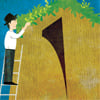Are you a homeowner? If you are, you probably yearn for the open road. Imagine, a life without mortgage payments, plumbing, lawnmowers, snowblowers, meter readings or alarm systems! Who coined the term "homeowner" anyway"? "Homeowned" sounds more like it.
If you're a tramp, you probably yearn for a home. For a spot of permanence on this spinning globe, for a cube of space that holds the capriciousness of the world at bay. The joys of the open road? Maybe in an adventure novel read in an easy chair by the fireside.
So what are we? Nomad or couch potato? Are we transient beings for whom movement is life and "at rest" an inscription for the gravestone? Or are we rooted souls, for whom the "journeys" of life are just so many guises of the singular quest for home?
How [does one fulfill] the mitzvah of dwelling in the sukkah? One should eat, drink, and live in the sukkah, both day and night, as one lives in one’s house on the other days of the year: for seven days a person should make his home his temporary dwelling, and his sukkah his permanent dwelling (Shulchan Aruch, Orach Chaim 639:1).
Perhaps the most interesting model of the dweller/journeyer duality in our nature is the sukkah, the branch-covered hut that serves as the home of the Jew for the seven days of the Sukkot festival.
The halachic (Torah law) definition of the sukkah is that it is a dirat ar'ai, a "temporary dwelling". If the words "temporary" and "dwelling" sound contradictory, they are; indeed, they give rise to contradictory laws regarding the construction and habitation of the sukkah. For example, if the branches of the sukkah's roof-covering are piled on so thick that the rain cannot penetrate, the sukkah is disqualified — it's a house, not a sukkah. On the other hand, if it's raining in the sukkah, you're not obligated to eat in it — the sukkah is your home, and if it were raining into your home, you'd move to another room. Also: If the walls are taller than 20 cubits (about 30 feet) it's not a sukkah — not a "temporary" structure; but if they're too flimsy to withstand an average wind, it's also disqualified — not a "dwelling".
In other words, the Torah wants us to take an essentially transient structure and make it our permanent home. Or else it wants us to look at our permanent home and understand that it is, essentially, a transient structure.
Chassidim have an interesting habit. When asked to explain something, they offer a story. And then they tell another story, making the opposite point.
Two stories, then. The first story takes us back some 50 years. A young yeshivah student was about to embark on a trip and wrote to the Lubavitcher Rebbe for a blessing. In his reply, the Rebbe urged the young man to utilize the opportunity to accomplish something positive in every place he would stop during his trip. The Rebbe used the Mishkan, the portable sanctuary that accompanied the people of Israel in the travels through the desert, as an example. At their every encampment, the people were instructed to set up the formidable structure — which consisted of hundreds of parts and required an army of more than 8,000 people to assemble — even if they were staying just a single night. For a Jew, concluded the Rebbe, there's no such thing as merely "passing through" a place. Every moment in life has permanence, by virtue of the fact that Divine Providence has guided us to this particular point in time and space for a specific purpose.
The second story is told of the visitor who, stopping by the home of the great Chassidic master Rabbi DovBer of Mezheritch (d. 1772), was outraged by the poverty he encountered there. Rabbi DovBer's home was bare of all furnishing, save for an assortment of rough wooden planks and blocks that served as benches for his students during the day and as beds for his family at night. "How can you live like this?" demanded the visitor. "I myself am far from wealthy, but at least in my home you will find, thank G‑d, the basic necessities: some chairs, a table, beds..."
"Indeed?" said Rabbi DovBer. "But I don't see any of your furnishings. How do you manage without them?"
"What do you mean? Do you think that I schlep all my possessions along with me wherever I go? When I travel, I make do with what's available. But at home — a person's home is a different matter altogether!"
"Ah, yes," said Rabbi DovBer. "At home, it is a different matter altogether..."







Join the Discussion